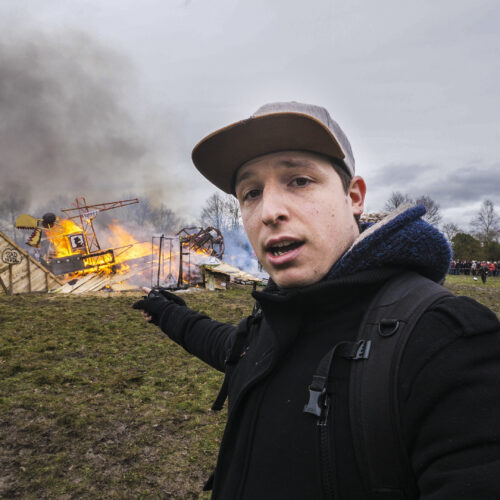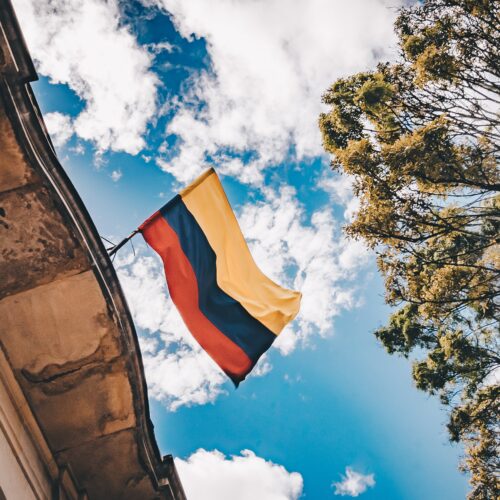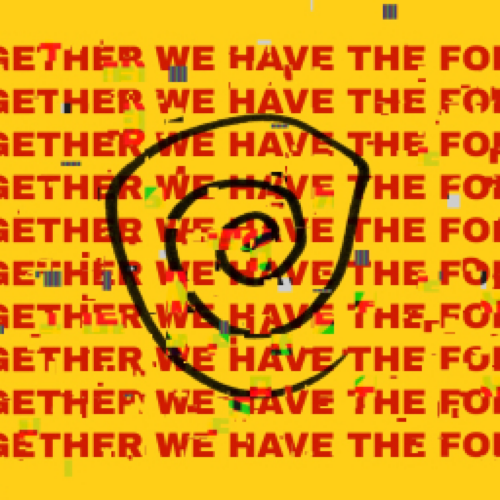A specter is haunting Europe—the specter of the Holocaust. All the powers of old Europe have entered into a holy alliance in deference to this specter: Chancellor and Commissioner, Scholz and Macron, European liberals and German police.
Where is the movement in opposition that has not been decried as antisemitic by the parties in power? Where are the movements that have not hurled back the branding reproach of antisemitism, against the more advanced state powers, as well as against its reactionary adversaries? Why is German trauma blinding foundations to the truth that “never again” is now?”
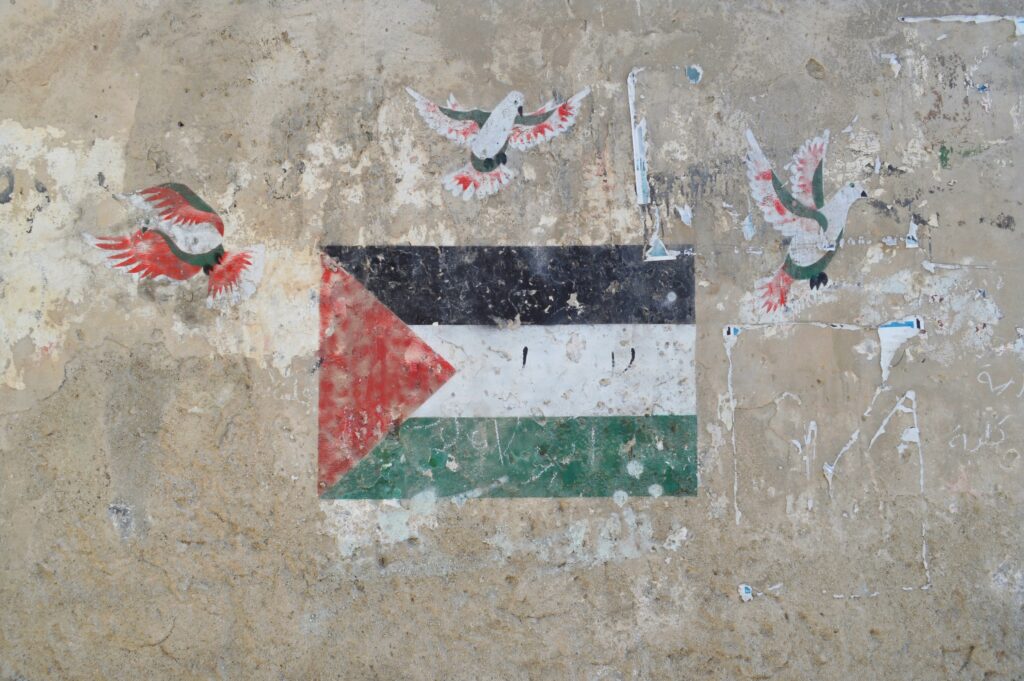
Never again means never again for everyone. That’s why Germany has had a historic responsibility to ensure that the ongoing ceasefire is enforced. No excuses, no exceptions, no “yes, but’s…” In horror we have witnessed that somehow, in the 21st century it is contentious to call for an end to an ongoing genocide; to call for an end to the arbitrary killings of tens of thousands of Palestinians; the destruction of schools, hospitals, and places of worship; or the siege and starvation of displaced communities, denying them even the most basic of needs. Those who call for an end to the genocide in Gaza are met with accusations of antisemitism—a knee-jerk defence mechanism against anyone daring to criticise Israel. It is precisely because we say never again, that we are fighting this genocide.
As the Guerrilla Foundation, we refuse to be forced into silent submission. We strongly oppose antisemitism, both in our activist communities and in society at large. We also stand in full solidarity with the Palestinian people’s struggle against colonialism, oppression, and apartheid. These two standpoints are not mutually exclusive—if anything, they’re mutually reinforcing. The unspeakable crimes committed against the Jewish communities in the past were made possible because Jews were singled out and deemed “different.” We believe that leveraging jewish exceptionalism, whether for geopolitical purposes or due to personal traumas, is a form of anti-semitism itself. Let’s not make the same mistake again by absolving the Israeli state of the crimes it’s committing and granting it special privileges under the guise of protecting Jews. We condemn all forms of racism—whether it is antisemitism or islamophobia—and will continue to hold Israel up to the same moral standards as we do any other state. We do this not despite the moral injustice unleashed upon the Jewish people, but because of what we have learned from their experience and others.
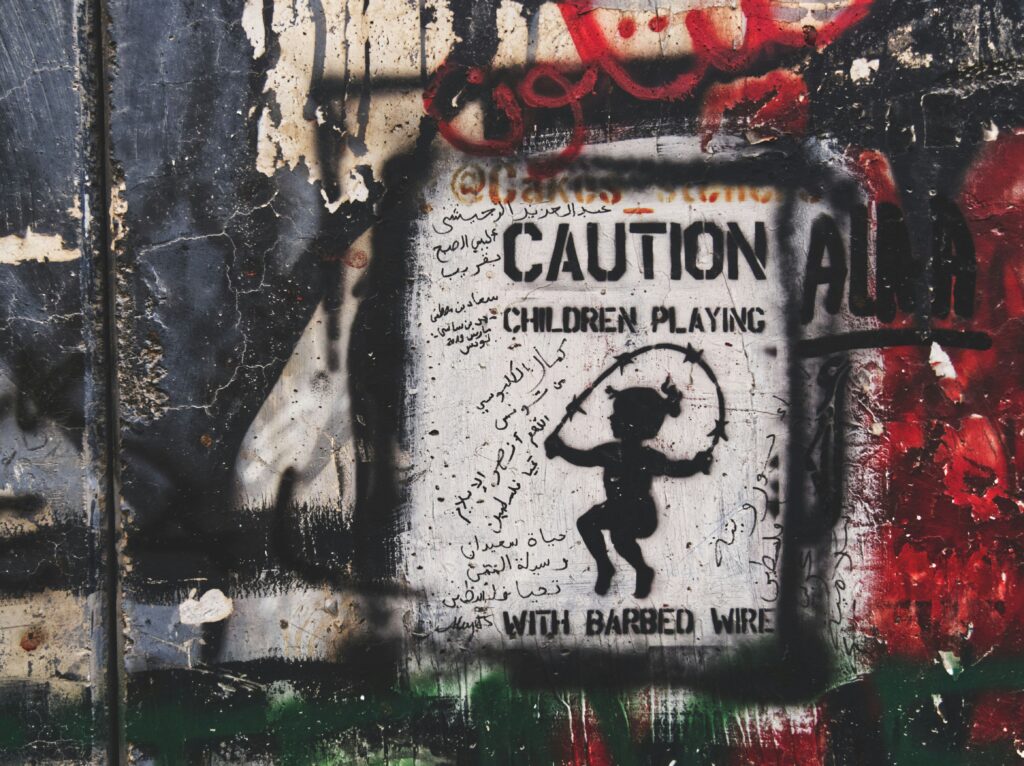
Now, we hear you ask, do we also condemn the October 7 attacks by Hamas? Yes, we mourn the loss of innocent lives on and since that day – and we also think that no act of violence, however gruesome, ever justifies genocide. Therefore, we’d rather not engage with the question of whether we condemn the attack when we’re talking about the genocide in Gaza. We’re open to discuss the intricacies of the historical roots of anti-colonial violence, Islamist radicalisation, and popular resistance against occupation any other time, but not if it’s used as a discursive trick to legitimise genocide.
In the European colonial imaginary, Palestinians are attributed with all sorts of racist and orientalist prejudices. Too many tolerate the denial of Palestinian rights here in Germany. They’re believed to be the cause of their suffering, are said to be war-loving people, unreasonable, and in a strange twist, are even blamed in some revisionist histories as those who caused the Holocaust.
Genocide and racism are intimately linked: from the European caricatures that Jews are evil and conniving, to the dehumanisation of the Nama and Herero people in Namibia. And few forms of racism are worse than those of settler colonial projects. We, therefore, refuse to accept the framing of the occupation of Palestine as a conflict between Jews and Muslims; between civilization and barbarism; or between light and darkness, as Israeli Prime Minister Netanyahu put it. Rather, we see it as one between coloniser and colonised; oppressor and oppressed; between settler and native. Holding this view does not mean denying the history or geopolitics of Israel. It means accepting the complexity of it, while viewing the struggle of the Palestinians through a decolonial lens might reveal some uncomfortable truths that don’t fit neatly into what is deemed appropriate and proportionate forms of resistance in Western eyes. Yet, instead of avoiding this discomfort, we embrace it, we ask difficult questions, sit with our discomfort, try to dispel our cognitive dissonance, and act — and we invite you to do the same.
Of course, there are clear mechanisms that ease the European conscience. The easiest is dehumanisation; criminalisation helps too. Over the past months, we’ve seen heavily armed German riot police attacking peacefully protesting Palestinians and their allies, targeting anti-Zionist Jews with accusations of antisemitism, and kidnapping Palestinian children for waving the flag or wearing a keffiyeh. Let us be honest about this: if racism wasn’t so widespread, there would be a public outcry condemning such blatant police violence. Not only is there no public outcry, but this authoritarian oppression is being held up as a virtue in the name of anti-antisemitism. This anti-Arab racism is justified in the name of combating antisemitism, promoting the vision of this conflict as a religious, rather than political, one, and ignoring the fact that both have their roots in European colonial racism.
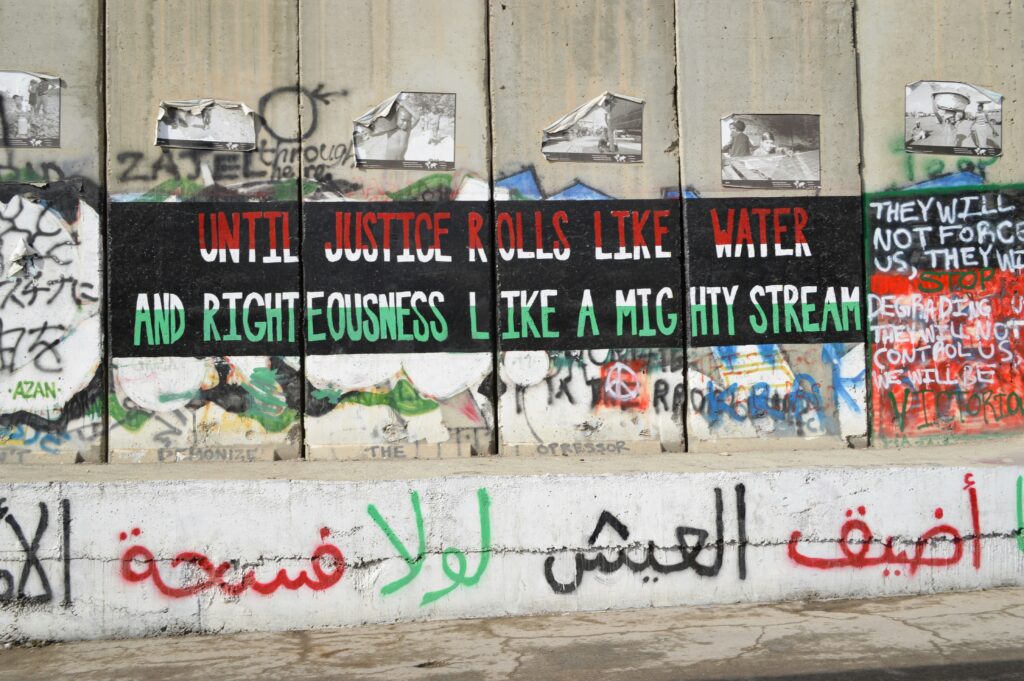
We recognise the responsibility we hold as a philanthropic institution based in Germany to see through the fog of historical guilt and recognise the Israeli government’s onslaught on Gaza for what it is: genocide. Our moral obligation in Germany is especially important, as we know very clearly where the German capital which fuels German philanthropy comes from: once again, genocide. This is not a term we use lightly or for political purposes but rather out of moral obligation to name genocide as it is unfolding and not only after it has been attempted. On the contrary, only by taking politics out of the equation and looking at the cold hard facts of the situation on the ground in Gaza can we come to an objective understanding of the scale of the crimes Israel is committing. Don’t take our word for it; listen to the numerous experts who have shared their opinions on the matter. Such as the Israeli-American Professor of Holocaust and Genocide Studies Omer Bartov, who wrote in August 2024 that,
“[…] at least since the attack by the IDF on Rafah on 6 May 2024, it was no longer possible
to deny that Israel was engaged in systematic war crimes, crimes against humanity and
genocidal actions. [This attack] clearly indicated that the ultimate goal of this entire undertaking from the very beginning had been to make the entire Gaza Strip uninhabitable, and to debilitate its population to such a degree that it would either die out or seek all possible options to flee the territory.
Countless international institutions, from the Office of the UN’s High Commissioner for Human Rights to the International Court of Justice and the International Criminal Court, two of the world’s highest legal institutions, have pointed out how Israel’s stated military goal of destroying Hamas in no way justifies the level of violence and destruction it has unleashed upon Gaza. These are the same credible voices that document and prosecute against all genocides.
Most recently, Amnesty International joined the fray and published a report concluding that Israel is committing genocide in Gaza. In the words of Agnès Callamard, AI Secretary General: “Israel has repeatedly argued that its actions in Gaza are lawful and can be justified by its military goal to eradicate Hamas. But genocidal intent can co-exist alongside military goals and does not need to be Israel’s sole intent.” Even the Pope has written that “what is happening in Gaza has the characteristics of a genocide.”
It’s time to tell some brave truths: instead of supporting the Israeli state as it weaponises the trauma of the Holocaust and instrumentalises the October 7 attack by Hamas in its efforts to eradicate the Palestinian population of Gaza, we believe that the historic responsibility of the German state, businesses, and institutions is to prevent such crimes from happening ever again. If German guilt was not an instrument of oppression and instead a genuine attempt to reckon with the principle of genocide beyond its historical episode during the Holocaust, then the German state would not be an accomplice to genocide today.
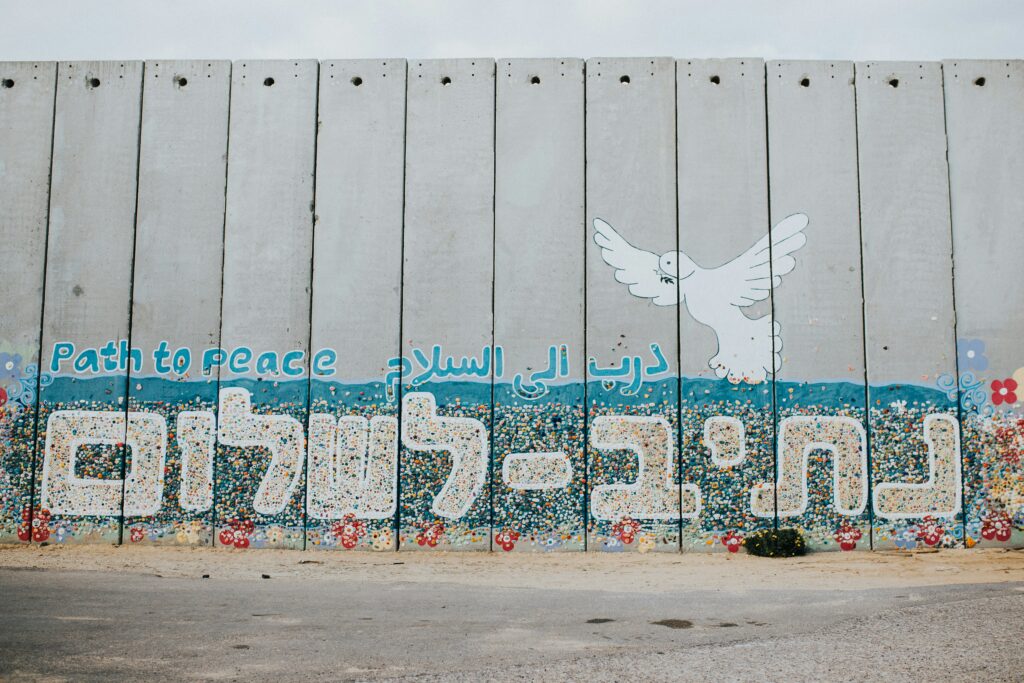
That is why we are speaking up and why we have redistributed resources in the past year to Palestine solidarity groups across Europe, to groups defending pluralist communities in the West Bank, and to organisations offering humanitarian aid directly to Palestinians in Gaza. And we invite other radical funders in the German-speaking world to do the same. To be a radical funder means not shying away from enacting the same values that we look for in our grantees, even when that risks complicating the work we’re trying to do.
As funders and activists, we see it as our duty to help free Palestine from the burden of German guilt. As Europeans, it is not our place to decide the future for Palestine – only they can do that. But it is our role to challenge our direct culpability – either through silence or through action – in their right to self-determination. Still, we can play a role in cutting German state support for a settler-colonial apartheid state in the process of committing genocide against the native population. A ceasefire is just the beginning, the tip of the iceberg, while the reparation work, the rebuilding and the resistance against further settler expansionism stretches ahead.
We call on German philanthropic institutions to look beyond the blindness of German guilt and instead to acknowledge our shared humanity; to recognize the reality that is the genocide in Gaza; and to do what they when can faced with such injustice: to recognize that silence is complicity and that never again is now.
Key intentions behind this blog piece:
– not an excuse, but an explainer as to why we are a part of Funders4Palestine.
– why we use the term “genocide”
– stressing the importance of speaking up in German context / as a German funding organization
– no overt support for violence, but offer critical support for anticolonial resistance, recognizing its legitimacy without necessarily condoning all its different iterations
– use of blogging as tool / aid for funders to fall back on in case they’re accused of funding anti-semitism


